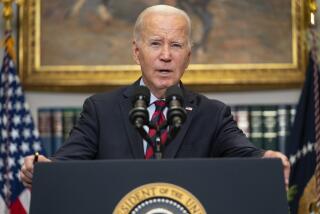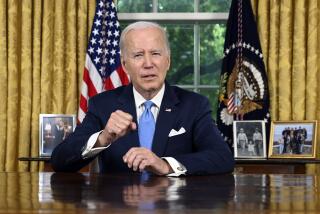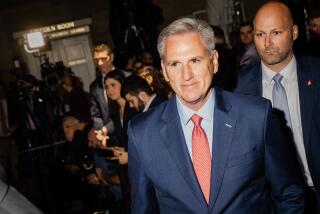Lew moves up debt limit deadline to late February
- Share via
WASHINGTON -- Congress must raise the nation’s debt limit by late February, a couple of weeks earlier than previously projected, because of an expected large outflow of cash for tax refunds next month, Treasury Secretary Jacob J. Lew said Wednesday.
In a letter to House and Senate leaders, Lew accelerated the deadline for lawmakers to act to to increase the $16.7-trillion debt limit to avoid a federal default.
He said Treasury officials made new calculations on how much time they could buy using so-called extraordinary measures to juggle the nation’s borrowing needs after Feb. 7, when the suspended debt limit is reinstated.
“When I previously wrote to you in December, I estimated that Treasury would exhaust extraordinary measures in late February or early March,” Lew said.
PHOTOS: Federal Reserve chairs through the years
“Based on our best and most recent information, we believe that Treasury is more likely to exhaust those measures in late February,” he said. “While this forecast is subject to inherent variability, we do not foresee any reasonable scenario in which the extraordinary measures would last for an extended period of time.”
Failure to raise the debt limit before the measures expire could lead to default and would risk another cut in the U.S. credit rating. A partisan standoff over raising the debt limit in 2011 led Standard & Poor’s to downgrade the nation’s AAA credit rating for the first time.
Republican leaders have said they don’t want to default. But they also have been firm that a debt limit increase should be offset by at least an equal amount of spending cuts.
“All I know is that we should not default on our debt; we shouldn’t even get close to it,” House Speaker John A. Boehner (R-Ohio) told reporters last week.
But President Obama has said he would not negotiate over an increase in the debt limit, raising the possibility of another standoff.
Senate Majority Leader Harry Reid (D-Nev.) said last week the debt limit did not need to be raised until “sometime in May.” But that conflicts with estimates from the Treasury and Bipartisan Policy Center analysts who closely track the issue.
After Reid’s comments, the think tank reiterated its deadline of “late-February to mid-March.” Its analysts noted that the a delay in tax-filing season caused by the federal government shutdown last fall meant the deadline probably would be closer to “the front end of our projected window.”
Lew made clear Wednesday that time is running short and Congress needed to raise the debt limit soon “to provide certainty and stability to the economy and financial markets.”
As part of the deal ending the partial government shutdown, Congress suspended the debt limit until Feb. 7. If the limit isn’t raised by that date, the Treasury can use measures, such as suspending investments in some federal pension funds, to extend the nation’s borrowing authority.
Last year, the measures helped give Congress about five months additional time to raise the limit.
But Lew said this year was different because the measures will be used during February, when the government is paying out tax refunds. Also, the government shutdown delayed the tax-filing season, which will concentrate more tax refunds in the weeks after Feb. 7.
ALSO: Reels and deals at Sundance
Covered California faulted for low Latino enrollment
Only one of 11 subcompact cars passes insurance group’s new crash test
More to Read
Inside the business of entertainment
The Wide Shot brings you news, analysis and insights on everything from streaming wars to production — and what it all means for the future.
You may occasionally receive promotional content from the Los Angeles Times.











